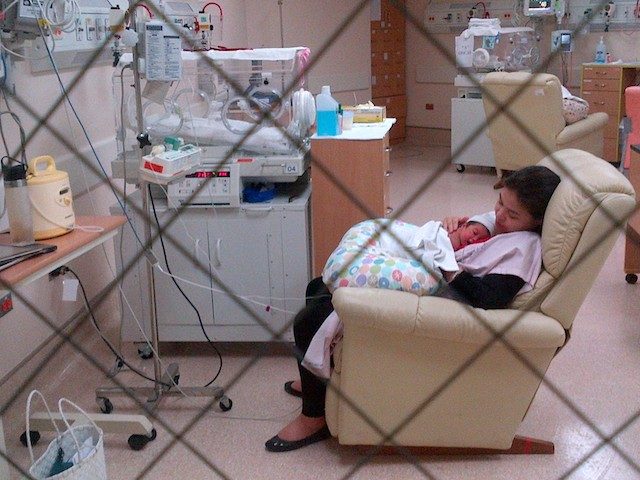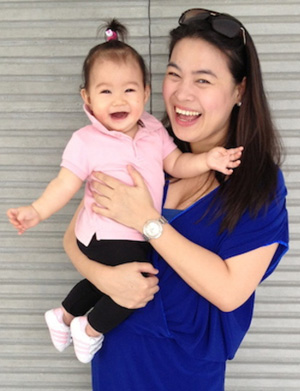SUMMARY
This is AI generated summarization, which may have errors. For context, always refer to the full article.

I didn’t give nursing much thought during my pregnancy as I already had a handful of medical issues to worry about. Among other things, I had APAS (*Anti-Phospholipid Antibody Syndrome), an autoimmune system disease that required daily steroid injections to keep our baby safe.
I knew breastfeeding was something I wanted to do and I naively thought it would all come naturally. How hard could it be? I was confident that once I put my child on my breast, she’d figure out what to do.
Days before my due, I told my doctor my intention to breastfeed. She assured me that she and the hospital are pro-breastfeeding. I shouldn’t worry about my daughter being given formula should we encounter complications during delivery. Thankfully, it was an uneventful caesarean operation. Shortly after my husband cut our umbilical cord, our child was placed on my chest where she slowly inched her way to and gently suckled on my right breast.
After we had both recovered, we were wheeled to our room together. Nurses placed our baby on my chest every few hours so she could breastfeed. There was no visible milk yet but I was told that it was normal. Milk will flow after a few days, but it doesn’t mean she’s not getting any right now, the doctor said.
Two days after my operation, we were supposed to leave for home. But there was a typhoon so we decided to extend our stay. Strangely, our daughter spent almost all that day just sleeping. She was more active the day before. When the resident pediatrician did her rounds, we told her about our observation.
She took our child to the examination room and drew blood from her foot. They found out that our daughter’s blood sugar had sunk unusually low (a reading of 17 when the normal should be about 60). She was immediately transferred to the Neonatal Intensive Care Unit, where she would be confined for almost 3 weeks.
More challenges
I stayed with our daughter the entire time. I would spend days and nights sitting beside her incubator. Every couple of hours, nurses would help me breastfeed her. It was such a challenge getting into the right position because of the IV and other wires attached to her. After nursing, I would pump whatever milk I could get. Sometimes I could only yield as little as one ounce from both breasts after pumping for 20 minutes.

When her condition failed to improve after a week, doctors suggested feeding her through a tube that would be inserted through her mouth. Perhaps, they said, she’s exerting too much energy sucking while breastfeeding. She was still given breast milk.
But since I could not produce enough milk, we supplemented with their stored donated breast milk. We were also asked to purchase milk from another hospital’s milk bank, with a written explanation from our doctor about our baby’s situation. This was the first time we had heard of such concepts – donated breast milk and breast milk bank.
When we were finally discharged from the hospital, we were given strict instructions to stick with breast milk. Our daughter had transient hyperinsulinemia (her body had problems regulating her own blood sugar). We were taught how to cup-feed our daughter with donated milk since my output was still below normal (most likely due to stress and lack of sleep). We were told to hold off bottle-feeding so as to avoid nipple confusion.

Unsure about how to secure breast milk for our baby, I posted a shout out on my Facebook account. We were overwhelmed with the response. Friends and friends of friends willingly came to our aid. Turns out we knew quite a number of people who were new parents as well and were dealing with an opposite problem – an oversupply of breast milk. They were more than glad to free up their fridge of stored frozen breast milk.
The struggle however was in feeding our child. Cup-feeding was far from easy and could get really messy. We soon improvised and switched to a medicine dropper. But our daughter would get impatient and start wailing in between drops.
She was extremely irritable and would cry for hours (no kidding!) at night. She was not colic or anything. We were told it could be some sort of trauma from her NICU experience, where she was pricked for blood exams several times in a day for 17 days. She did not like being held by others and only clung to me. Or more accurately, clung to my breasts.
I would eat my meals within 5 minutes, usually standing up while holding her. I showered as quickly as I could and ignored calls of nature as long as I could. For months, I slept at night sitting with pillows on my back to prop me up while our daughter slumbered sprawled across my chest atop a nursing pillow. She just would not let go of me and there was not much I could do. I had never felt so needed and useless at the same time.
Yet despite all the unlimited dede time and more than adequate milk donations, our daughter was hardly gaining weight. Not a few well-meaning friends and family urged me to give formula a try if only to plump her a bit. At 3 months, our daughter still looked like a newborn. I was conflicted and scared but was bent on continuing to breastfeed. Thankfully, my husband understood and supported my decision. He would spend weekend mornings driving around the metro with a cooler to collect milk from donors whom we called our daughter’s Milk Mamas.

It also helped that our pediatrician was an excellent breastfeeding advocate. She told me not to fret so much about weight gain but watch out for milestones instead. She hooked me up with past patients who overcame their difficulties with breastfeeding.
Still, I wanted to find out why my milk supply had not increased in spite of all the nursing and pumping I was doing (plus all the lactation massages, supplements, soups and what-not I was taking). I sought a lactation expert doctor. Based on my medical profile, she surmised I have unsettled hormonal issues causing my low breast milk production. To address this, I would have to subject myself to more tests and treatment – something my body could not take anymore as I have been a virtual medical guinea pig since day one of my pregnancy.
Not giving up
Refusing to give up, I continued breastfeeding with whatever supply I could manage. Luckily, we found a steady milk donor in an old college friend whose son was almost the same age as our daughter.
When it was almost time for me to return to work, I would get up every two hours at night to pump. Back in the office, I lugged around a second heavier bag packed with all my pumping paraphernalia. I would hide myself in my cubicle with a rolling whiteboard. The designated breastfeeding/pumping station in our office was at the clinic, which was in another wing on the ground floor (my office was on the 8th floor). I found out that other officemates made do with the toilet, or a big cloth cover-up behind their desks. A number of them gave up a few weeks after. It was just too much of a hassle, one of them told me.

A few months after, I would find myself giving up too. Not breastfeeding, but my work. By then our daughter’s weight was getting more stable. She was already eating solids but still loved lounging on my chest. I could have prematurely weaned her so she won’t be too attached to me anymore. The mere thought broke my heart.
Turning my back on my career used to be unthinkable…until motherhood (and yes, breastfeeding). It’s been more than a year since I made the decision and our daughter just turned two. There is hardly any trace now of all the difficulties we had during her first months.
Our daughter is healthy and happy. She not only met her milestones, she even surpassed a lot of them. She has memorized her favorite songs and lines from her favorite stories. She can express herself in simple, complete sentences.
As for me, I still wonder if becoming a full-time breastfeeding mom was the wisest move. Maybe not, career-wise. But for sure, it is the one role I am proudest of. – Rappler.com
Add a comment
How does this make you feel?
There are no comments yet. Add your comment to start the conversation.